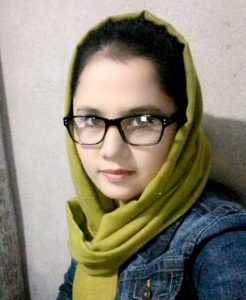Insecurity Deprives Women of Their Opportunity of Progress

Asma Sahebzada talked about her school days, that she has always dreamed of having a building for the school where she was studying. Even now that she has studied until higher level, she is dissatisfied with the education conditions of women in her neighborhood because, according to her, issues such as insecurity is still an obstacle to women’s education and their progress.
In an interview with the CSHRN, Asma Sahebzada said that the biggest issue women in Baghlan face is their low level of education and they cannot continue learning due to insecurity. She adds, “One of the points that always reminds me is that I am not a master’s degree holder and therefore my privileges as a lecturer are not added. The problem is that in the current situation, there is no room for more education and capacity building for female lecturers.”
CSHRN: Please tell us more about your experience regarding this problem.
Sahebzadeh: For me, insecurity has not only prevented me from continuing my education, but also I have sometimes missed opportunities to enhance my skills and gain effective work experience. Due to some security considerations, including once in a legal education program in one of the districts, I was selected as a teacher, but I could not participate due to insecurity; The program organizers said that they would not insure the security, so I missed that opportunity just because it was impossible for me to travel alone in that unsafe situation.
CSHRN: Apart from what you said, what other problems do the women of Baghlan face?
Sahebzadeh: Women in the provinces have always been marginalized to the toughest point because in a way, the message reaches them that they cannot do great and effective things. The rights of Baghlan women have always been violated, for example, they do not participate in the administration as they should, and the level of illiteracy and lack of awareness is very high among women in Baghlan. The problem with this is that when women from districts and villages are invited to participate in awareness programs, they sometimes look for the financial aspect or even they see if there is a meal provided at the program for the participants, and I think one of the reasons is their disbelief in these programs because every program that comes up is temporary and symbolic.
CSHRN: How can the outcome of the peace talks improve security situation?
Sahebzadeh: When it comes to peace, every citizen envisions a peaceful and trouble-free life. Of course, peace does not only mean stopping war but ending violence is one of the most basic steps to achieving peace; peace must be applied in the true meaning of it. It should be established in the society that the peace of mind of the people is one of its examples. In any case, we are hopeful about the outcome of these talks; Because the government’s policy is clear in this regard and the government is committed to bringing peace, however, we expect the authorities not to allow the achievements of the people to be sacrificed because this is not something that is easily achieved. On the other hand, the international community’s support for the peace issue in Afghanistan has given people a huge hope.
CSHRN: Have the Taliban’s view of women changed?
Sahebzadeh: Although Afghanistan is an Islamic country and its laws are in line with religion, the Taliban somehow believe that Afghanistan and Afghan people are moving towards Westernization, and one of the things they always emphasize is the issue of hijab. On the other hand, they had previously said that women have the right to work and study as long as a safe environment is provided, which in my opinion indirectly means restricting women. Who makes the environment unsafe? The Taliban themselves are the cause of the insecurity. We hope that the government’s negotiating team would be able to negotiate with the Taliban team with logical arguments and convince them.
CSHRN: What is your expectation of the peace talks?
Sahebzadeh: First, not only in Baghlan, but all over Afghanistan, women should have an equal share of men when it comes to work within the government. Another issue is that the privileges of the victims’ families, which are paid to them by the government, must be preserved after the peace agreement.
Ms. Sahebzadeh says that a peace is acceptable in the presence of which the gates of schools and universities are open to girls and women and the work of women is not limited.